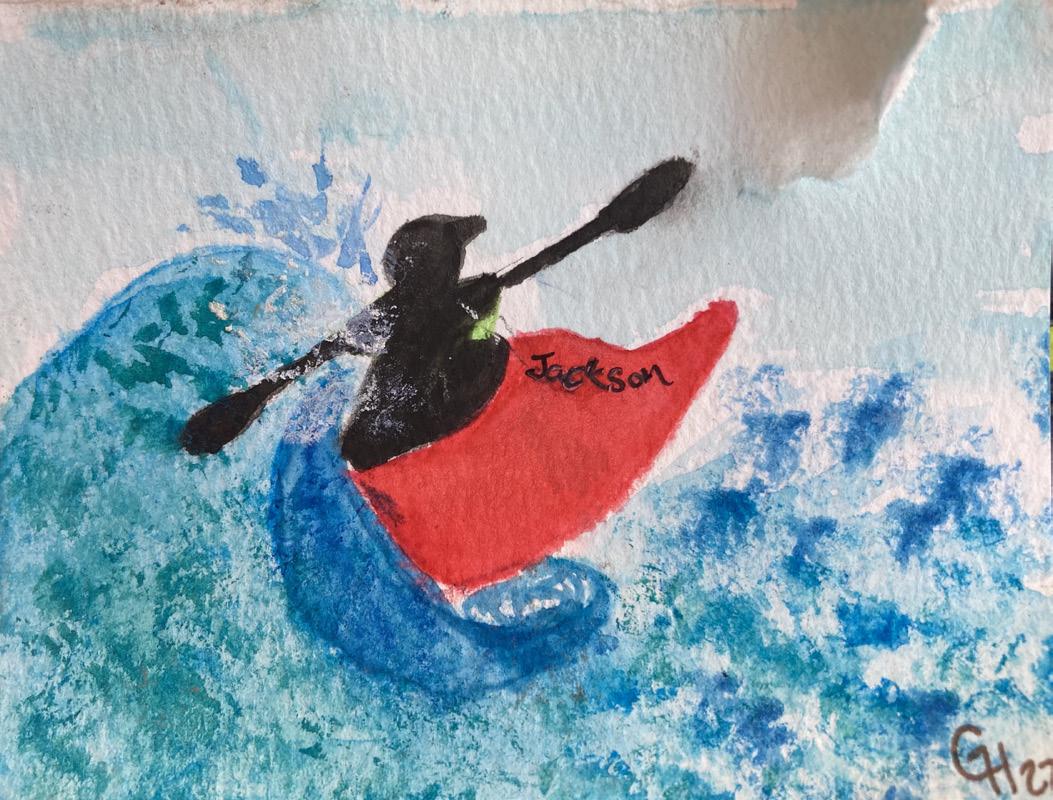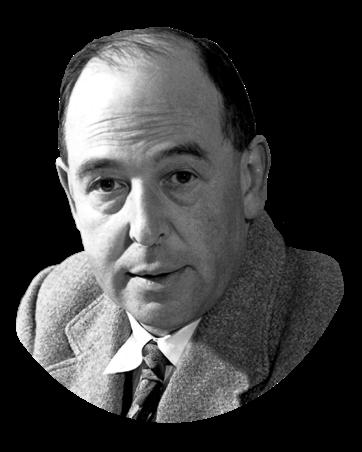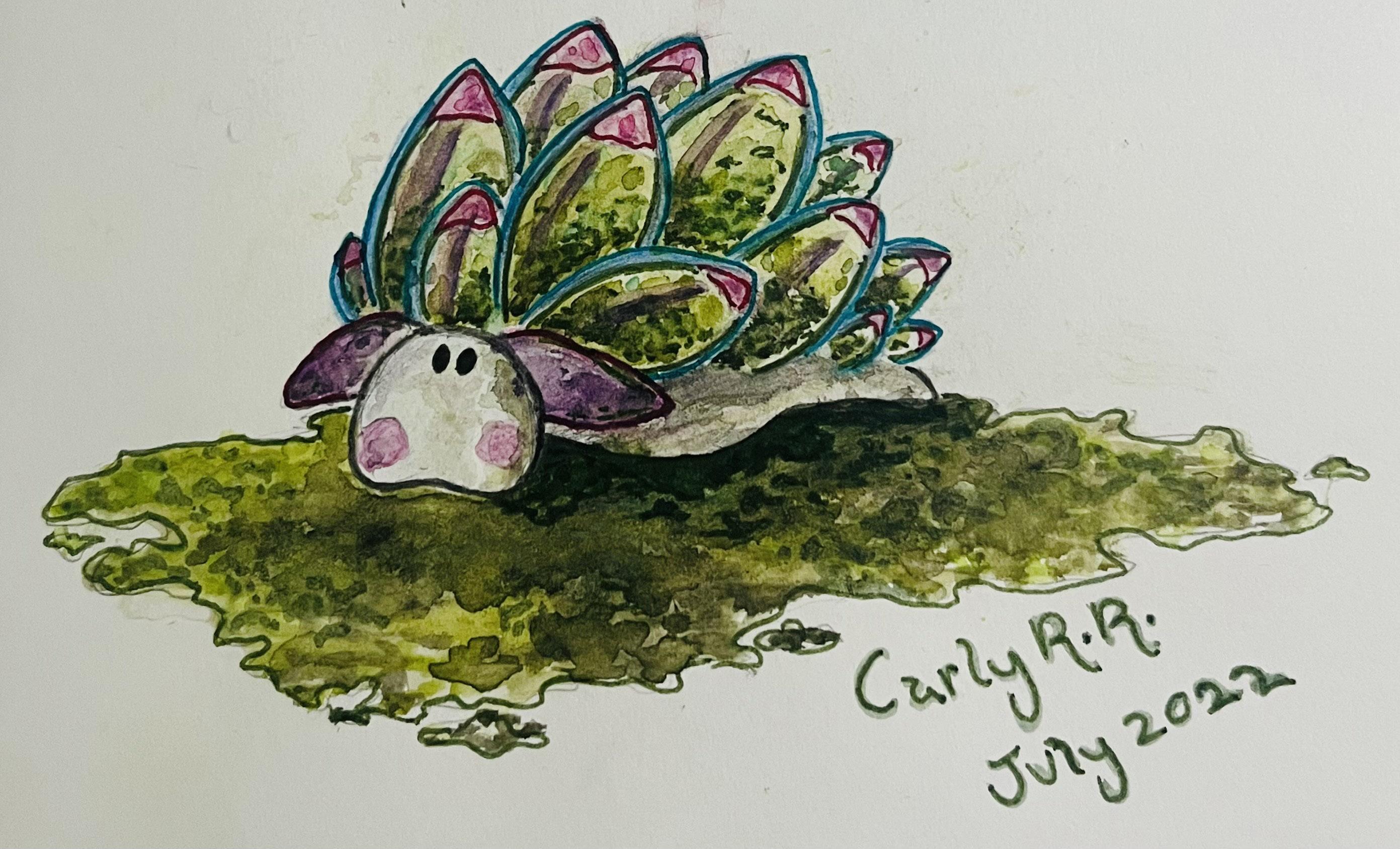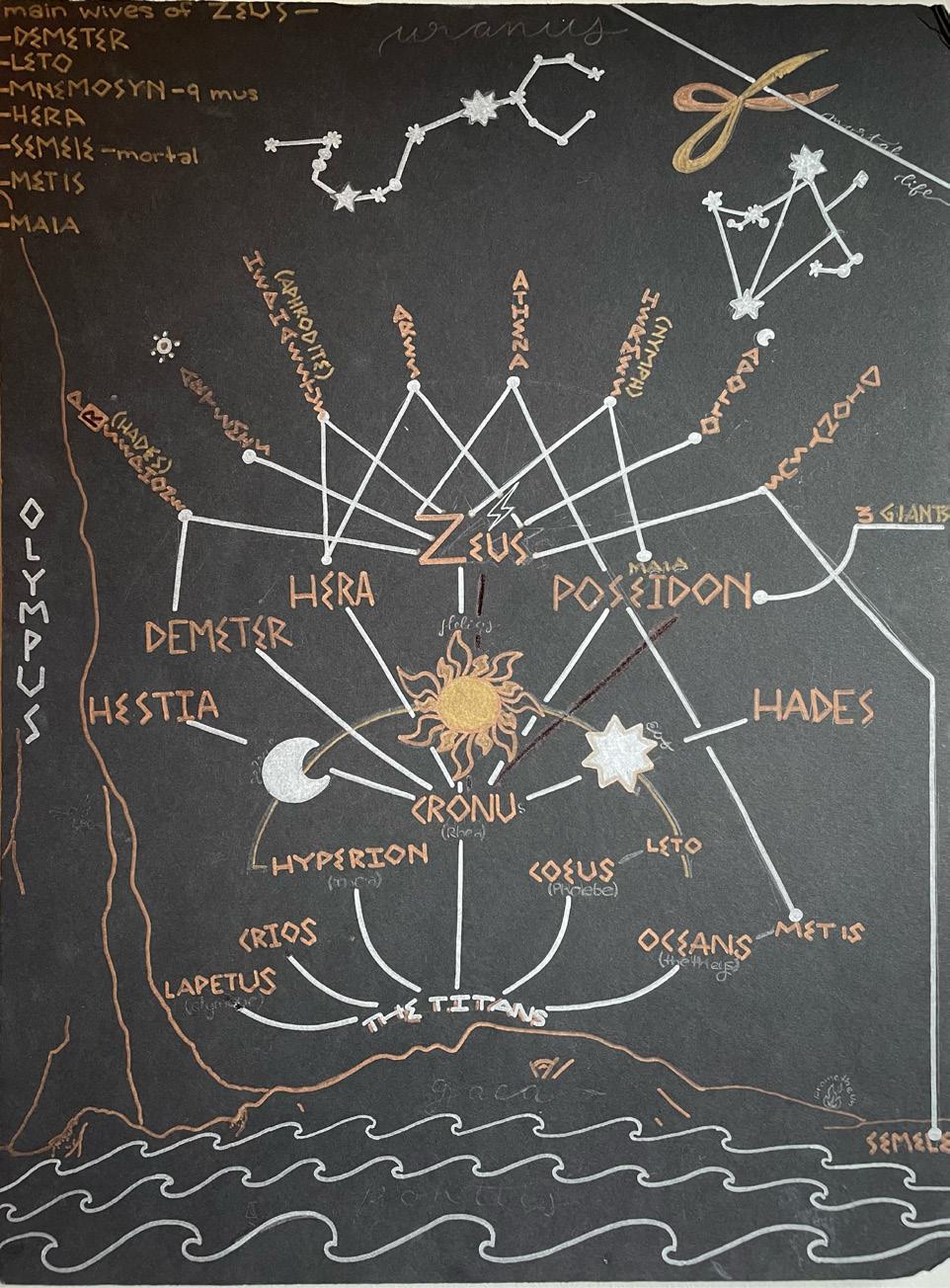Kepler Education’s Student Magazine





Letter from the President 3
Note from the Academic Advisor 4–5
Full fathom five thy father lies by William Shakespeare (from The Tempest) & Excerpt from The Rime of the Ancient Mariner by Samuel Taylor Coleridge 6
Note from the Student Council President & Kepler Life! 7–9
Writing, What’s the Point? by Doyle Rockwell 10–13
Surfin at 17,000cfs!, Surfin & Water Fun (Photos) by Grace Harris 14
Of Trees and Gardens (Poem) by Hailey Hasic 15
Shimmering Lake (Poem) by Corin Batchelder & Mountain Lake (Painting) by Grace Harris 16
What is Humanity? An Existential Consideration of the Essence of Humanity by Gavyn C. Wallace 17–20
Dore Council, Dante, Aristotle & Aquinas (Artwork) by Autumn Kennedy 20–21
King Roughvoice, A Satire by Sophia Marstall 22–27
Sea Slug (Poem & Artwork) by Carly Raquipiso 28
Titans & Gods (Artwork) by Remember Mallory & A Jug of Tea (Photo) by Elyse Wallace 29
Overwhelmed (Terza Rima Poem) by Cambrya Kersey & A Feather on the Sand (Photo) by Elyse Wallace 30
An Analysis of Twilight and the Modern Romance by Marshall Leary 31–33
The Tractor Council (Poem) by Hailey Hasic 33
Cover image by Ruth Lawton
Magazine design and layout: Carissa Hale
Kepler Eccentric logo design: Josiah Nance
Copyright November 2022 Kepler Education

In the ancient world, wells were an important feature of a town or village be cause they were the community’s primary means of getting water. Digging a well was an occasion for rejoicing (Num. 21:17–18), while protecting a well from marauders was an occasion for battle (Gen. 21:25–26; 26:15, 18; Exod. 2:16–17). Often, wells served as a meeting place, especially for women of the community who drew water for their households (Neh. 2:13; John 4:6–8).
Because it was such a prominent feature of community life, the well became a metaphor for other deep and abiding matters of importance in the human experience. For example, the writers of Scrip tures use the well, figuratively, to refer to a “forbidden woman” (Prov. 23:27), a wicked city (Jer. 6:7), a source of pleasure (Prov. 5:15; Song of Sol. 4:15), and the fountainhead of salvation (Isaiah 12:3).
When our own well collapsed this past summer, I was suddenly forced to think about the importance of water and how and where we would get it. Till then, I naively took for granted easy access to wa ter. Just turn on the sink or shower, and voila! , water. Our experience taught us a new appreciation for our ancestors’ burden of making sure there was enough to drink each day. We also gained a new appreciation for what it means to be a city, a community of people who share and rely on each other for our necessary resources. Like it is with many aspects of life in the modern world, water being no exception, it is easy to take for granted the resources and processes involved in making convenient what was arduous in the ancient world.
Education is a lot like drawing water from a well. There are occasions for rejoicing, occasions for striving, and sometimes we take its availability for granted. And in every case, it’s an occasion for discovering the importance of living as a community. Moreover, while some education can be likened to a shallow well—depression in the earth whose sole purpose is to access a ground spring or collect rainwater—classical Christian education is more like the ancient artesian well that spews its life-giving refreshment to the surface from the depths of creation by means of the eternal hydrostatic pressure of God himself.
May God bless you in this current year as you strive to live faithfully in community, drawing from the ancient artisan wells of classical Christian wisdom.
By God’s Grace and for His Glory, Scott Postma President, Kepler Education
Dear students,
I forget what I was going to write about.
The line delivered above would be an excellent joke if only I had put it after the next few paragraphs. Instead it has arrived as one untimely born, and I must now put the horse before the cart. Or as the excellent philosophy memes in #random-and-en tertainment would say, the horse before Descartes.
As I was saying, I forget what I was going to write about.
Last week John Keats’ Ode to a Nightingale came up somehow, somewhere, in conversation. I honestly don’t recall how, but I opened a tab in my browser to the poem and left the tab up, poem unread, for a few days. I dislike Keats, but wanted to read it regardless. I misremember precisely why. And trust me, these lapses in memory will be amusing soon. The first few lines of Ode run so:
My heart aches, and a drowsy numbness pains
My sense, as though of hemlock I had drunk, Or emptied some dull opiate to the drains
One minute past, and Lethe-wards had sunk…
Now, it is impossible for me to read of the River Lethe without thinking of Billy Collins’ excellent 1990 poem Forgetfulness. Upon reading Keats I fell down a happy rabbit hole of knowledge and re membering, the opening to which was Collins’ poem. The Lethe is a river the waters of which cause drinkers to forget their past. It is one of the five rivers of the Greek Underworld, and appears in the Roman epic Aeneid , which I taught through this year. When I was still young and boasting of a sharp er memory than I have now, I was struck by Collins’ lines obliquely mentioning this river.
Whatever it is you are struggling to remember, it is not poised on the tip of your tongue or even lurking in some obscure corner of your spleen.
It has floated away down a dark mythological river whose name begins with an L as far as you can recall…
The entire poem is a lovely meditation on forgetfulness, oblivion, and death. I love it for itself, but I cannot deny that much of the reason the poem slapped me in the face with a memorable love fish is that as I read it, I could not for the life of me remember the name of the river which begins with an L. As Wooster might put it, the irony entered into my soul. Well, Wooster would have said the whatsit, and Jeeves would have said the iron, and then I would have said the irony. We would have shared a laugh.
And that moment of communion is what this missive is about. I have been coy, I confess. This has nothing to do with forgetfulness, but rather with memory and knowledge.
In writing about memory and knowledge, I am writing of community, of common language, of the ties that bind. I am writing of memes, the deep old memes of the decadent West which may one day rise again to Christian greatness, its iron unironically reforged as Andúril was.

What is a meme but an idea that is shared across a culture? The word meme was used before the internet. Seriously, look it up.
Because of my education (mostly the informal bit), Lethe means something to me. It is part of a complex of reference, knowledge, and connection that, whether I will it or not, sparks through me any time it comes up. Keats’ poem is loaded with dryads, fays, and immortal Birds. Collins’ poem for gets the Muses, the planets, a state flower, a famous battle. When these things come up, an involun tary response takes place: they bring to mind an entire complex and context of truth, goodness, and beauty that almost demand a response. You respond similarly, whether I say Thermopylae or Agincourt or Pelennor Fields , whether I say Carthago delenda est or rex iudaeorum or cogito ergo sum . The River Lethe is a meme.
This involuntary response to shared knowledge is why we seek to be educated, dear students. Edu cation is not the memorization of facts; it only begins there. Education is plenary knowledge, livable knowledge, in the context of community and in the light of Christ. We use that knowledge to speak to each other.
The Bible is our meme base (all your base are belong to us , as our own poets have said). It is our common point of reference across time and space, binding us to brothers in sixth-century Egypt and twen ty-first-century China. It is the beginning and end of our language and our education. This is why our education is Christian.
From that abundance our memeing grows. Most of us are born in the West, in the legacy and fading light of Christendom. We drink from Western waters primarily, and not as a form of chauvinism (for fun, look up the origins of that word). Rather, we connect with our ancestors spiritually and physi cally by studying the best of the West, Christian and pagan, and harness that best to the sun-chariot of the Gospel. This is why our education is Classical.
If you know who Pepe the Frog is, you know that he evokes many emotions and ideas, that he au tomatically draws a plethora of associations for us. Soon Pepe will float happily down the river of oblivion; not soon will Shakespeare, Dante, and Vergil; never will Scriptures of our God. Drink from the river of knowledge, take in and dole out a bit of Pepe, a bit of Shakespeare, a lot of Gospel. Speak in Dante and Vergil, in Gospel. Connect with your classmates, your family, your church, with all the saints who from their labor rest.
Some of the ancients said there was another river to complement the Lethe, the dread Mnemosyne. This river would make you remember everything, perhaps even attain omniscience. It was the river of knowledge. The Mnemosyne was seen as a curse, because who would want to remember everything, all their sins, all their regrets? But I’ll tell you who. The people of Jesus’ grace. So jump in, the water’s fine. Know things forever, beginning now, and talk about them.
Drink deep of your education so that you may speak. What you are doing this year is not for nothing. It is equipping you with a language, enabling you to commune, making you human.
Desiring you many cups of cool water,
“Full fathom five thy father lies” by William Shakespeare (from The Tempest )
Full fathom five thy father lies; Of his bones are coral made; Those are pearls that were his eyes: Nothing of him that doth fade, But doth suffer a sea-change Into something rich and strange. Sea-nymphs hourly ring his knell: Ding-dong. Hark! now I hear them,—ding-dong, bell.
Day after day, day after day, We stuck, nor breath nor motion; As idle as a painted ship Upon a painted ocean.

Water, water, every where, And all the boards did shrink; Water, water, every where, Nor any drop to drink.
The very deep did rot: O Christ! That ever this should be! Yea, slimy things did crawl with legs Upon the slimy sea.
About, about, in reel and rout The death-fires danced at night; The water, like a witch’s oils, Burnt green, and blue and white…
n ote from the s tudent C oun C i L P resident
Hello Kepler family! I am so excited to be releasing our first Eccentric issue of the 2022 to 2023 school year! Although we have only just begun, this year has already brought so much excitement. The Kepler quad is growing like never before and introducing amazing conversations, discussions, jokes, and companionship.

Many thanks to all those of you who have helped to get this fall rolling including teachers, par ents, students, and club members. It is beautiful to see everyone coming in with their own piece of talent or personality and helping to complete the Kepler family. I especially have to thank our men tors and club officers who have gone the extra mile to make Kepler life awesome. Your hard work is appreciated by everyone. I know you will enjoy the selection of talent displayed in this magazine.
Speaking of clubs, they are all back in full swing with old favorites from last year and even a few new ones including Comedy Club and Writers Club! You can hear from some of our presidents down below and I encourage you to consider joining one of them! It is never too late to join a club and I know how happy each group would be to welcome you.


I hope you all have a wonderful finish to the fall semester and always find a way to see joy in your studies, even if it’s not your favorite subject. As some of you navigate the first year or two of high school, you may be struggling. But remember you are not alone and that things will always get better.
Blessings, Margaret Johnston, President of Student Council







KEPLER LIFE clubs include:
Student Council, Writing Club, Comedy Club, Chess Club, Music Club, Poetry Club, Photography Club, and Book Club
Hello, Kepler students!
Kepler's new Writing Club is in full swing! We welcome everyone to share their writing and hear the construc tive criticisms of other members. Here, we look at both the grammatical side of writing as well as the flow of the writing. We encourage the fictitious writings of our prospective authors and applaud the thoughts of our rhetorical geniuses. Come join us twice a month on Tuesdays from 4:30-5:30 CST to learn the nuances of writing!
We have had a wonderful time this term enjoying and dis cussing poetry together. We are currently covering poems which fall under the theme of “Autumn.” The words of the great poets give me greater appreciation for this beautiful season. I am truly amazed by the joy and encouragement that is evident in our meetings. Each Poetry Club meeting always brings me such joy and insight, as fellow nerds and wordsmiths carve time out of their evenings to spend in restful contempla tion of the beauty of language. We would love to have you join us this Fall as we continue to build and cultivate a community that searches out truth, beauty, and goodness. If you have any questions, feel free to contact me. I would love to hear from you.

 Hailey Hasic Poetry Club President
Hailey Hasic Poetry Club President

It has been an amazing year so far for all the clubs, and our very own photography club has been blessed with new faces and new memories. This semester, we have already looked at hundreds of beautiful photos from our crew of photo clubbers. At every meeting, we have continued our tradition of the “one-minute-wonder,” led by the secre tary. For this event we turn off our microphones, grab our cameras, and endeavor to take a beautiful picture in five minutes or less. Before the meeting ends, we share each other’s work, including everything from family vacation pictures to household objects and adorable pets, and of course, the results from the five-minute-wonder.
As to plans for the future, we hope to have a Kepler-wide photography contest as we have in the past. We also plan on continuing all of our great discussions about the art of picture-snapping, exploring God’s creation by taking our cameras outdoors and capturing the beautiful moments of life through pictures. We work as a team at every level. Wherever you are in your experience with photography, whether amateur or semi-professional, no matter how much photography means to you, as a hobby or dream job, there is a place for you in this club of young students. Take a camera and you can explore. Take a picture and you can admire it. Join the club and you can share the experience with others and receive the kind of encouragement you are looking for! We meet twice a month on Thursdays at 5:00 p.m. Pacific Standard Time. We would be thrilled to have you join us.
Doyle Rockwell President of Photography Club
Hello Kepler Family!
Greetings from the Book Club. We hope you will consid er joining as we explore the world of recent literature this school year. This October we read selections from The In nocence of Father Brown by G. K. Chesterton, and for this November we are reading On The Edge of the Dark Sea of Darkness by Andrew Peterson. We hope you will join us for these fantastic books! We meet once a month to discuss a work of literature selected the previous month. Any and all are welcome to join the book club and take part in our awesome discussions! I hope to see you there with us.
Marshall Leary Book Club PresidentHello Kepler!



We are pleased to announce the inception of a new club: Comedy club! Although we have only been around for a few weeks, we have already started pro viding laughs and sparks of creative genius to our club members! We meet every other Monday at 4:45 PST. During our meetings, we critique sketches that we have found or made over the week, with the goal of improving our comical prowess. Whether you are a novice or a pro at comedy, we would love for you to pop in and join the fun! We hope to see you soon!

Dear Kepler family, Last year, Music Club was held for the first time and we loved it! After listening, discussing and playing music, we decided to create a piece of our own. Everyone pitched in, from compos ing the notes, to recording the instruments, and assembling the video. It was such a joy to create and share the final product with everyone. This year, I know that each member is eager to continue listening, discussing, playing, and potentially composing music with each other. What causes such joy in composing or depth in discussing a genre? Simply said, God and His Word. Music is an outpouring of the soul; it is our thoughts put into notes. Personally, my favorite part of this club is how we hear, discuss, perform, and create notes that bring forth praise. Come join us as we adventure into the King’s land of notes and composers!

Soli. Deo. Gloria, Jillian Hoge

Why do we write? If fiction is un believable and nonfiction is too factual to be interesting, then why write at all? The writer who would say that is missing out on one of the greatest adven tures mankind can ever know. Aside from any heavenly experiences he might have, aside from the greatest of life’s experiences, know ing Christ—next to that there is imagination and the purebred enjoyment it brings.
We read books as arm chair travelers, pilgrims who desire to see places they have never been, busy streets, qui et towns, country fields and farmhouses, forestlands that stretch for miles and twist their fingers around moun tain lakes and secret valleys. We read to hear sounds we have never heard. Perhaps you have never heard a can non’s roar or tasted blood in battle, but you can remem ber the last time worker-men bored through the sidewalk and you bit your lip until it bled, wondering when the noise would stop. Every sight, every sound, every scent that can be smelled, each emotion that can be felt, and everything that exists on a material level can be written. I do not say that everything at the spiritual level can be written. Too much is unknown for that to ever hap pen. And that may be the one reason people are still writing, still exploring, to investigate
the hidden realm of the soul. But, at the most basic understanding of things, writing is hard, and it should be hard. Nothing truly noble is ever easy to accom plish. In the opening lines of his famous Cri sis, Thomas Paine writes, “What we obtain too cheap, we esteem too lightly. It is dearness only that gives everything its value.” 1 How do you value your writing? If you think it is sup posed to be an easy task, you must have very low esteem for writing. There are those moments in a writer’s work when he can whip up a batch of words without shedding any tears, but those moments are rare. In most cases, a hasty writing job foretells some heavy editing later on, and no one rejoices about that.
C. S. Lewis was known for publishing his works without editing them. But we cannot all be Lewis. Some of us have to be Roberts or Michaels or Janets or Marys. We cannot all be famous and wonder ful right away. At least three things come before that. Hu mility. Wisdom. Prayer.
Humility is needed to tamper down the writer’s massive ego. We all have it, living inside of us, and our own work of creation brings the prideful monster to life. No of us wants to admit to writing something terrible.
 1 Thomas Paine, The American Crisis I
1 Thomas Paine, The American Crisis I
No matter how egregious it might be, we will defend it because it is ours . But merely owning something, such as a dusty antique, does not give it real value.
“Wisdom is the principal thing. There fore, get wisdom.”2 As a writer, your wisdom will be your best writing buddy. The discern ment to judge between good agents and scam artists. The ability to tell successful publishing houses apart from successful money grub bers. You will need wisdom in every step of your writing journey.
Prayer. How many times there have been when only a prayer could save something I wrote! It could be said that good writers write on their knees. And is it not true? Since ev ery well-written piece of writing touches the human soul in some way, the Spirit of God cannot be left out of the equation. He is the author of truth, after all. And if you want to write about the world and all that’s in it, who would be a better person to ask than the Creator?
But that does not answer the first ques tion. Why write at all if it is such a challenge? After all, if I never plan to be published, if I write for myself and blush to think of show ing my stories to anyone alive, and if I already work hard enough without adding to my woes by writing and writing and writing, then what is the point? Ask yourself, what is the point of breathing? What is the point of remember ing? Why do we spin yarns and tell tales if it is all pointless? Writing is just as essential to the human race as breathing to the lungs. Stories circulate through us, a steady under beat that never dies. In the age of the world when most people could not read or write, they told sto ries by word of mouth. One of the greatest stories of all time, The Iliad , was orally told
by the blind bard Homer, who would have moved about from place to place and sung his stories to the tune of a lyre. And then there was the light of learning, and people wrote it down. Memory flows like a current of blood from generation to generation, and each story that is told to one generation weaves its way to the next through the thread of tradition.
Sometimes writing for yourself is all you need for motivation. Even if you do not plan to be published, someone someday might find it and publish it, and someone else will sue you when you are fifty years dead. Emi ly Dickinson only published ten poems in her lifetime. Samuel Pepys did not publish a word in his life, but his diary of nine years became famous later on.
Writing for personal fulfillment might be the only motivation you need. In his book, “The Basic Patterns of Plot,” Foster-Harris speaks of the writer who inverts reality and story, inverting himself in the process. “We live inside ourselves, in the invisible world. But the word, and particularly the printed word from which we seek results, is outside in the visual world. To get the value from outside to inside, or inside out, we must somehow teach ourselves to invert. It is a simple, but enor mously difficult thing to do.” 3 I have heard of some who write just for the experience of having themselves turned inside out through a story they wrote. One published author I have met spoke of how writing made him a more confident individual. A young lady at a writer’s conference gave a short speech on how writ ing was a balm for her and her only comfort when she felt suicidal. Sometimes writing is as serious as that, not always, but sometimes.
There is no crime in writing for your own benefit. It allows you to write what you 3 Foster-Harris, Basic Patterns of Plot
feel with all the freedom there can be in writ ing. But with that freedom comes the price of loose liberty, of breaking too many rules about writing that exist for a reason. It is a skill to imagine an audience for yourself, even if you are one of those unpublished, closet ed geniuses. But if you are wary of having an imaginary audience dictate what you write, you can always write to an audience of one. You. Keeping a journal is one of the best ways to start writing because it lets you be honest with yourself. After all, a writer is someone who talks to himself, every time he writes, every time he thinks. It is a voice reaching in from outside and reshaping itself on paper. It is that honesty with yourself and that freedom with which your voice flows in and out of you that makes your writing unique and original, the only piece of its kind.
The next level of writing also has a spe cific purpose. Writing for an audience. Steven son wrote that “The difficulty of literature is not to write, but to write what you mean; not to affect your reader, but to affect him pre cisely as you wish.” Most writers do not have some noble mission to bring joy or sentiment to earth. But if the audience does not enjoy what you write, you will never make any profit from writing. And even writers have to eat. It is also a fact that if no one else enjoys read ing your work, you might not enjoy writing it as much. If writing feels dull and tiresome, it might be time to try some different tech niques. But above all, make it enjoyable. That may seem difficult, but there are ways to have power over your writing, first by having pow er over yourself. Once you know what should be written and you develop your own style of writing, then the actual writing is so much easi er. Pen to paper, mind to matter, heart to God, soul to Heaven.
It has been said by many people that ev ery story type that can be written has already been written. The originality of “plot” ended with the Greeks. Many of Shakespeare’s plays were based on old models he wanted to revive. Some even accused him of plagiarism. But he told his tales in a unique way that only he could have told them. That is the writer’s mission, not to invent new models, but to tell old stories in a way that is unique, to bring the world back to life one word at a time. It severely needs it. People change, the world changes, and time works its way through our lives, but the litera ture of the world helps dictate whether we will change for the better or for the worse. That is our quest. Every book should be a tiny mes sage of some sort. That is what gives it real value. You do not have to state it bluntly, but it will be revealed in the words of your charac ters, in the lives they live, in everything that is said or heard or smelled or seen. Imagination is a picture of reality, after all. And our imag ination as human beings is one of the most divine concepts about us. It is something that everyone possesses at some level or another. Never say to someone, “You have no imagina tion.” It is not even something to joke about. They have one. Buried, perhaps, but still living in the soul. And whenever someone picks up a book or reads an essay, he is letting you slip inside his head.
Every word you write will sink into his mind, slowly, softly, but ever so surely. Doctors say that there is no medical proof that humans truly forget anything. It is all stored in the re ceptacle of the mind, condensed into small bits of information, but still present. What you read, what you watch, what you see, what you hear are all pressed into your mind like flowers between the pages of a book. And everything you have ever known is poured into words
when you write. All you have to do to build material for a story is live and listen and turn it into words. That is part of the magic of writing. That is what makes it so elating. All your mem ories are acting out their different parts on the stage of your imagination. The lifeblood of human nature courses through your fingertips, onto the page. Feelings are expressed. Opin ions are made. Worlds are shaped, built, and destroyed. Tears are shed. Blood is pumped from heart to vessel and back again ten million times before it makes sense. The breath of ten thousand years of humanity whispers in the writer’s ear. Sometimes it takes years to under stand. Sometimes the current of human nature is never understood. But that is one more reason to write. To understand humanity. To understand yourself. You are one part of humanity, are you not? That is where you can contribute your equal share.
God gave us all certain characteristics that connect us with one another as spir itual beings. Imagination is one of them. Wisdom is another. Acknowl edging a higher power is still another attribute that all of humanity shares. Once we recognize that higher power Who set the earth in motion, we can recognize our place as stewards of it. Some of us are preachers. Some of us are stu dents. Some of us are simply scribes who write because it is the only thing that makes sense to us. It is one duty we must recognize. Writers have a calling and that calling is more spiritual than we believe. Something so abstract as the heart and mind and soul of man cannot be affected by anything unspiritual. Logic tells us that the avenue a writer treads on his way to the heart is spiritual as well.
Writing can be a lonely quest. Relatives do not understand why you rush upstairs to your desk so often. Friends wonder why you do not play more sports instead of burying your nose into a ream of paper. Acquaintances tell you that you need a real job. Family life interferes. Work- life, if you do have a “real” job, gets in the way. Franz Kafka worked as a barrister by day and existed as a writer by night. You might find that people understand you less and less, even though you seem to understand them and the world around you all the more. You might sense that the whole earth is sinking and you are the only person aboard who knows it. You might have a nasty showdown with your ego. You might like yourself a lit tle less when you fail and be too proud of yourself when you succeed. But the struggle is worth it. The battle is worthy of fighting. You have one life to live and the entire world to explore. You have Christ for your companion and eight billion souls to speak to. In the words of a publishing agent who spoke at a conference in the summer of 2022, who turned to the audience of young students, not smiling, but beaming in the light of the mo ment, “Don’t give up on what you have. I want to talk to each of you in ten years and hear you say, ‘here’s my novel’ or ‘here’s my devotional.’ I want to see that…the words you write today will change the world of tomorrow.” 4 And that is something we desperately need.


 by Grace Harris
by Grace Harris
 by Grace Harris
by Grace Harris
In a garden, gentle garden, In the cool of day, God was calling, searching, calling, Adam hid away, Lest the Maker, Holy Maker, His sins should perceive, And the Father, tender Father’s Spirit should be grieved.
Blessèd be the Lord our God, Who calls and seeks and gives. May our minds and souls and hearts All worship to Him give.
In a garden, gentle garden, In the dead of night, Blessèd Jesus, anguished Jesus, Prayed with all His might. For His children, blessed children, He would deign to die, That the Father, tender Father’s Mercy could draw nigh.
Blessèd be the Lord our God, Who calls and seeks and gives. May our minds and souls and hearts All worship to Him give.
On a cruel cross, cruel, bleak, wood cross, He was torn and hung, That the first sin, first, bad, mean sin, Might thus be undone. For a tall tree, tall, rough, hard tree, Was a fitting cost For that first tree, tempting first tree, Where innocence was lost.

Blessèd be the Lord our God, Who calls and seeks and gives. May our minds and souls and hearts All worship to Him give.
Now the Savior, Holy Savior, Walks and seeks and calls, And echoes words, His Father’s words, To those who hide and fall: “Where are you, dearest, blessed dearest?” He speaks into our ear: Still, still, my soul! And give Him answer: Say, “My Lord, I’m here.”
The water shimmers under the sun's ray. I step in, sending ripples about me. All the creatures dash quickly away. In a rush to flee what they fear—me. Down, under I dive to escape the sun's heat. Under the water is life.
Rock and sand beneath my feet House the crayfish, a pinching knife. Fish dash after the dancing bugs. Up they go! I hear the sound of birds. They fly across the lake, putting on a show. The water's laughing words
Tell of a world of wonder to see Down I go to relax under. I swim in peace and see A water full of wonder.
Mountain Lake by Grace Harris
by Grace Harris
Of all the questions addressed in phi losophy, perhaps none are as simple or complex as those concerned with the essence of humanity. What constitutes the essence of humanity is a question which has provoked inquiry for ages past. Is the essence of humanity developed through empirical ob servation, or inherent in the faculties of rea son? Is it objective or subjective? In what way does it relate to the imago Dei ? These questions are simple in that the objective human essence is something which must be taken for granted if any sort of social progress is to be made, but are complicated due to their depth. A human can look at another human and tell that they are the same kind of being, but to articulate why this is becomes difficult after one leaves the realm of empirical observation. For cen turies, philosophers have attempted to explain what constitutes the human essence. Some, like Descartes, asserted that the essence of hu manity is to be found in the state of rationali ty, whereas some, such as Sartre, claimed that humans have no inherent essence at all. The conversation of what constitutes the human essence is not relegated to philosophy, how ever. This conversation also permeates the realms of science and theology; is the essence of humanity contained in the state of rational animal? Is it spiritual? Does it rest in the imago Dei ? Although the definition of an objective human essence appears daunting, it is possi ble, if only in a manner which is subjective to
the definer. Indeed, the human essence1 is not to be contained solely in any one of these cat egories, but is found in a combination of them all. Humans are complex creatures, composed of many different systems working in harmo ny to facilitate growth and harmonious oper ation; the essence of humanity is very much the same.
The major question to be considered in this topic is whether the human essence is ra tional, empirical, or spiritual. Rationally speak ing, the human essence might be contained in the ability to think in a logical manner; em pirically, it may be found in the condition of rational animal or the filling of the tabula rasa Spiritually, the essence of humanity is to be found in the human soul, or the human con nection to God.
Réne Descartes (1596–1650) is perhaps the most famous rational ist of all time. The prima ry goal of Descartes was to discover that which in the world was objectively true through a system of radical doubt, not accepting the truth of any thing until it can be proven without a doubt. In the course of this goal, Descartes came to the realization that “whilst I wished to think that all was false, it was absolutely necessary that I,
1 In this paper, “essence” is used interchangeably with “na ture.” Although these terms do not mean quite the same thing, they are used in such a manner for the sake of simplicity.

who thus thought, should be somewhat; and as I observed that this truth, I think, therefore I am, was so certain and of such evidence that no ground of doubt, however extravagant, could be alleged by the skeptics capable of shaking it.” 2 In this manner, Descartes comes to the conclusion that human nature (the essence of humanity) can be found in the rational aspect of the human existence.
On the other side of the spectrum, JeanPaul Sarte (1905–1980) argued that “we define man only in relation to his commitments,” 3 and that “there is no human nature…man simply is…man is nothing else but that which he makes of himself.” 4 According to John M. Frame, Sartre argued that (in connection to the above concepts) essence is not a state which men have until after they die; only after death is it possible for the entirety of what made the man to be analyzed by others, and as “man is nothing else but that which he makes of him self” 5 this is the only time that men have es sence.6 By this argument, Sartre is an extreme subjectivist; there is no human essence apart from individual examples of essence.
It is to be noted that these two views rep resent different sides of a spectrum; Descartes argues for pure rationalism, whereas Sartre ar gues that empirical existence is all that consti
2 Rene Descartes, “Discourse on Method,” trans. John Ve itch, in The Enlightenment: Old Western Culture Reader, Volume 15 , ed. Daniel Foucachon (Moscow, ID: Roman Roads Media, 2020), 127–128.
3 Jean-Paul Sartre. “Existentialism,” in Existentialism from Dostoevsky to Sartre , ed. Walter Kaufman, trans. Hazel Barnes (New York, NY: Penguin Group (USA) Inc., 1975), 365.
4 Ibid., 349.
5 Ibid.
6 John M. Frame. A History of Western Philosophy and Theology (Phillipsburg, NJ: R&R Publishing, 2015), 351.
tutes humanity (“man simply is” 7). One phi losopher who falls in between these two (but does lean more towards Sartre) is Soren Ki erkegaard. Kierkegaard does not directly argue for the human essence, but asserts that human existence is to be found not in a condition of rationality or simple empirical existence, but in the choices that a man makes throughout his life. In this manner, existence is both rational and empirical; men are the choosers, and they make choices based on the world around them.
Kierkegaard does, however, distance this from rationalism by asserting that the choices made by men can not be rationally analyzed by them.
John M. Frame summarizes, “Existence is a ‘surd.’ You can live through it, observe it, but you cannot capture it in labels.” 8
The third major view is that the essence of humanity can be found in the relationship of man to God. One advocate of this theory is Verne Poythress (1946–). In the book of Gen esis, it is recorded that God “made man in his own image.” (Genesis 1:26) From this state ment and Genesis 27:28, Poythress asserts that man is among the animals, but that “he is also distinct from the animals, in that he alone is described as made in the image of God.” 9 In this manner, it can be concluded that human nature is something which can be found only in God. Humans and animals both exist in the same fashion, but God has given men some thing which He has not given to the animals; this gift is the imago Dei , and is what may be referred to as the human essence.
Although each of these theories have
7 Sartre, 349.
8 Frame, 314.
9 Verne Poythress, “Visible Things: Their Origin, Nature, and Purpose,” frame-poythress.org, Forward Design, September 26, 2020, https://frame-poythress.org/visible-things-their-or igin-nature-and-purpose/.
merit, there are situations in which they can not hold firm. On the rational side, the essence of humanity is supremely logical and can even progress to the spiritual; however, it is difficult to explain how the essence of humanity relates to the world of which man is an inhabitant. Vice versa, the empirical side explains how the human essence connects to the world, but does not explain human reason apart from the world’s influence on it. Spiritually, the answer that the human essence is found in the imago Dei may allow for more connection between the world and the spirit than the previous two systems, but is still incomplete; for example, the question is begged of whether the imago Dei is found in the rational spirit or the em pirical body. Even the medial positions leave unclosed gaps; even though human choices are very important, it must be asked where humanity finds the ability to choose, why he chooses, and how he chooses. Where, then, is the essence of humanity? As is often the case, the answer might be found in a mix of every system. How can such a mix be found, and how will it manifest itself?
C. S. Lewis (1898–1963), in his book of lec tures entitled The Aboli tion of Man , answers these questions through the use of theological anthropol ogy. In Men Without Chests , the first lecture in the book, Lewis states that “the head rules the belly through the chest.” 10 In this, Lewis asserts that the head is the in tellectual part of man, whereas the belly is the appetitive part of man; the chest is the intermediary between the two and is how the

10 C. S.
24.
head controls the belly. In his lecture “Faith & Reason | On Lewis’ The Abolition of Man: Philosophy or Theology?” Dr. Michael Ward addresses this point by explaining that, if man was only to exist in the head, he would “evap orate upwards” 11 and become like the angels, something which is not healthy for mankind; likewise, if we “devolve downwards into the belly”12 man will cease to be human, simply becoming a beast. The chest, then, is the in termediary through which man is called a “ra tional animal.” 13 He is rational in his head (his thoughts) but he is empirical in his belly (his bestial appetite). This argument can also ben efit from the spiritual side; Saint Augustine of Hippo (354–430) argued that the mind was the imago Dei rather than the body,14 which seems to agree with Lewis’ parallel of the head and the angelic. Moreover, Saint Thomas Aquinas (1225–1274) stresses the importance of the mind in conjunction with the body; although the mind can exist separately from the body, it is incomplete without the body,15 something which can be indirectly paralleled with Lewis’ chest. Although the head could theoretically
11 Dr. Michael Ward, “Faith & Reason | On Lewis’ The Ab olition of Man: Philosophy or Theology?,” February 4, 2022, Patrick Henry College, Purcellville, Virginia, 56:21, https:// www.youtube.com/watch?v=LIuL9-JzQ_o
12 Dr. Ward, “Faith & Reason | On Lewis’ The Abolition of Man: Philosophy or Theology?”
13 Dr. Ward, “Faith & Reason.”
14 Christian Tornau, “Saint Augustine,” in The Stanford En cyclopedia of Philosophy , Summer 2020 ed., ed. Edward N. Zalta (Metaphysics Research Lab, Department of Philosophy, Stan ford University, ©2022) https://plato.stanford.edu/entries/ augustine/#HumaMindImagGod
15 Ralph McInerny and John O’Callaghan, “Saint Thomas Aquinas,” in The Stanford Encyclopedia of Philosophy , Summer 2018 ed, ed.Edward N. Zalta (Metaphysics Research Lab, De partment of Philosophy, Stanford University, ©2022) https:// plato.stanford.edu/entries/aquinas/#BodSou
operate without the belly,16 it is not supposed to. Having addressed the possibility of the ima go Dei being rational while also requiring the empirical, the question becomes one of faith; faith in whether or not to accept the imago Dei in the first place, a subject which (although im portant) is not considered in this essay. In this manner, the essence of humanity is rational, empirical, and potentially spiritual depending on the standpoint of faith.
Of all the questions addressed in philoso phy, perhaps none are as simple or complex as those concerned with the essence of humani ty. For centuries, philosophers have attempted to explain what constitutes the human essence.
16

Some, like Descartes, asserted that the essence of humanity is to be found in the state of ra tionality, whereas some, such as Sartre, claimed that humans have no essence at all. There are still others who (like Kierkegaard) advocate for a middle position, and others (such as Poy thress) who argue from a spiritual perspective. Regardless of the merit each system has, none of them are complete when they are separate; however, if they are combined, the general metaphysics of the human essence can be ex plained in such a manner as to include all vari ables. Through considering the many different arguments and how they relate to each other, it is possible to gain a better understanding of what makes us human.
Dore Council by Autumn Kennedy by Autumn Kennedy
by Autumn Kennedy

 by Autumn Kennedy
by Autumn Kennedy
In a green land of golden fruit and gilded grasshoppers, a king lived in a castle on a hill. He had a garden filled with oriental flowers and birds that could sing any song in the world. He had built it for his only daugh ter, who was blind. She sat in it for hours and hours, just listening. She became very accus tomed to beautiful, peaceful sounds and hat ed raised voices and barking, squealing, and growling of any sort. Her father always made sure all was quiet around her, but this had made her spoiled and conceited, for she now expected only to hear what she liked to hear.
Her father realized he was growing old and his daughter would need someone to care for her in his place. He decided she must mar ry and invited many suitors to the palace. The princess hated the idea and told her father so.

“Living in another country would be ter rible, father! It would be loud and everyone would be shouting and brawling in the streets. It is so quiet here, perfect for just you and me.”
Her father hesitated. He didn’t want to cause his daughter pain, he had avoided the prospect her entire childhood. But old age is a persistent imp and nothing can slow its mis chief. The king persuaded his daughter to at least meet the suitors, for his own sake.
The meeting could not have gone any worse than it did. The princess was deter mined to have her own way and therefore de termined to hate the suitors. They came up to her to start conversations and she would grimace and cover her ears and move three steps away.
“I cannot bear to hear them, father!” She complained. “They had horrible voices. Duke
What’s-His-Name sounds worse than a bear with a stomachache. Count Don’t-Ask-Me-ToRemember was so high-pitched my ears must have shattered, as well as the windows around us. I’m sure I have a headache from the bawl ing shouting of Lord I-Don’t-Know, and…”
“But my dear,” the king said, “You did not say all this to the suitors themselves?”
“I am sure I did! You always remove a barking dog if it sneaks into the garden and so I sent these dogs from the palace as dogs deserve.”
Now the king had not realized how haughty his daughter had become by her long retirement and at first he was shocked, and then ashamed, and then very upset. These men were sons of his friends and noble gen tlemen. They must all be furious!
“Were they…terribly offended?” He asked her nervously.
“Offended? I only told them the truth. Although…one was particularly rude. I have not told you about him yet, father, but his voice was the worst of all. It sounded like ra vens and gravel and nails on chalkboard all at once! In fact, I came up with the perfect nick name for him: King Roughvoice!”
Now, this suitor was the son of the king’s best friend and was practically his son. He had secretly hoped this would be his daughter’s choice. But now it seemed she had been rud est to him most of all. The king, usually so gentle and hesitant, was angry. His daughter spoke again.
“Well, now that we know marriage is not in my future, let us go and hear our court po et’s new song, father.”
“No.” He said firmly. “You have been discourteous to those gentlemen and un grateful to me, when I am merely trying to provide for you, and there must be a conse quence, much as I hate it.”
“Father! You are raising your voice to me!” She exclaimed.
“Do not try to change the subject. I have decided you’ll marry the next man who visits this castle, even if he sounds like a brass band conducted by Thor himself!”

“Oh, Father!” She cried. “You wouldn’t do that! You could never hate me so much!”
“Hate you? My dear, I do this because I love you.”
“It does not seem that way.” She said scornfully and rushed from the room.
The king sighed deeply, both remorseful and determined to keep his foot down. He wished his wife was here so he didn’t have to make these decisions alone.
At that moment, a lilting melody drifted through the window. The king looked out and saw a strange looking man on the drawbridge below. He was wearing a ragged poncho and striped hose; his felt hat had a long feather and a long pipe was making music at his lips. The king rushed down and called for the stranger to be brought in.
“Welcome, welcome!” He cried. “We love all kinds of music here, and pipes best of all. Play something to both cheer us and break our hearts and I will give you a splendid gift.”
The minstrel did not speak but he began to play. He played a melody like the smell of old books and the smile of an old friend and the sound of the ocean at dawn. He played a melody that reached into you and almost choked you, but you found it had only gently brushed you with its fingers. It was like noth ing the castle had heard before and the prin
cess, hearing it, came back to listen. When the music ended there was only the sound of dust floating through the air.
Suddenly the king burst into applause and shook the minstrel’s hand.
“You shall have your reward for that, my son! In fact, I have nothing less to give you than my daughter’s hand in marriage.”
The minstrel looked amazed and delight ed, but the princess gasped and fumed. She turned to her father. “Me? Marry him!? I can not! I shall never do it!” She was about to rush from the room when the minstrel followed and took her hand firmly but did not hurt her.
“Your father has promised me your hand. You must be my wife, whether you will or no.”
Oh, his voice was the worst she had ever heard. It was high and like a rooster’s and grunting like a boar’s all at once. It mostly came from his nose and then finished by whis tling though his teeth. She could not bear it and turned in agony to her father.
“Father? Will you let him take me away? Do you see how he treats me? Don’t you re member the lovely times we had together? It will hurt me so to leave!”
The king lowered his gaze and murmured, “Well…erm. Perhaps, she is not ready…”
The minstrel spoke. “You will not change my mind. She must come with me or this house is forever dishonored.”
The king squirmed. Courtesy and honor came very high in his esteem. He had prom ised and now he must follow through. He squirmed for a minute but the minstrel, whose piercing grey eyes matched neither his clothes nor countenance, was watching him steadily, so at last the king sighed and gave in. His wife would have admired his bravery, he was sure. He bustled away to get the priest and the lady and her betrothed were left alone.
“I…” The princess began.
“Do not speak, for I am tired of your voice.”
Tired of her voice? The nerve of this man! And him sounding like a dying peacock himself. She harrumphed and began to march toward the door. But he came and held her back once more. She shook him off and folded her arms. “Let…”
“Be quiet. Your father returns.”
Oh, how she despised this man! And she must marry him! She did marry him in the end, although it took all three men to get her through the ceremony. The thing was over and the minstrel took his new wife and set out from the castle.
They had to walk because the minstrel was so poor. Soon, the princess’s feet were very sore and they had to pause for her to rest. Faintly, they heard the sound of music coming to them.
“What music is that?” The princess asked. “It is so beauti ful.”
The minstrel said it was the music of the king whose country it was. Every night, he had splen did feasts and balls and new mu sic composed for the occasion. The princess knew who the king was, it was King Roughvoice, the man she had insulted.
“If only I had accepted him.” She said.
They started again and soon the princess had to rest again. They could actually see King Roughvoice’s palace by then but the princess merely heard the sound of birds and asked her husband what it was.
“It is the sound of the king’s
many birds in his garden. He has every kind of bird in the world, they say.”
The princess winced at the sound of his nasally voice and said, “If only I had married King Roughvoice.”
“Do you usually give terrible nicknames to those whom you wish to marry?” Her hus band asked.
“At the time, he seemed to deserve it. I despised him for wishing to take me away and change my life, but now that I am here instead, it seems his palace is more lovely than even my father’s.” And she let a single tear slip down her cheek.
The minstrel merely scoffed and told her to get up and follow him. Later, they stopped again in the village by the palace to barter for some suitable clothes for the princess. There was a murmuring and trilling of water near by and the princess asked her husband what it was.

“Merely the king’s fountains. They are clear as crystal with small, colorful fish that nibble your fingers in them.” He said.
The princess felt a great lump in her throat and managed to say ‘if only’ before her hus band interrupted her.
“If only you would cease wishing to be someone else’s wife! You were too silly to accept him so now you must content yourself with me.” Then he led her to his home: a small cottage, more of a hut, really, with a small window and large chimney that put more smoke into the house than outside of it.
It was miserable to live there and the princess ached to
be elsewhere. But the minstrel was not cruel and he played on his pipe for her in the evenings. He would go out and play to make money and buy their food with it. He also had to do all the housekeeping, as they had no servants and the prin cess was helpless at housework. Her husband was soon irritated by the way she sat and listened to birds all day and told her she must help him.
“What can I do? It is you that agreed to marry me, any way! I was happy and had no need of husbands.”
“See how you like being hungry, then!” He exclaimed.
But after a day she was ea ger to help them get food. He decided she must help him in the marketplace.
“You must sing while I play.” He com manded, but she quailed before it.
“What if I am seen by my father’s people? It would be horrible! What if I am made of fun of and jeered at?” She refused to help him.
But another day passed and her hunger was so great that she agrees to join him in the village square. He taught her common songs and childish ditties that the townspeople loved. Children especially loved to hear her and would gather around to listen. But they were loud and the princess hated the loud applause and cheer ing and how they sang off-key with the chorus. However, she agreed to go the next day, as mu sic was now her only delight.
It was even worse. The farmers had brought their animals to market and there was such a hullabaloo that the minstrel and
his wife were hard-pressed to make themselves heard. Soon they were ignored and even told to leave, so business could be done. The princess was sure her ears were broken by the terrible rough voices of the an imals and the farmers. She told her husband so.

“Well, you shall have to bear it, since tomorrow you will be on your own. This play ing does not pay enough, but your singing will still get us a little. I will look for a job to morrow and you must sing in the market.”
She flushed. “You would leave me alone to that…rabble! I will not do it!”
“Then there is only one option left. I must sell my pipe.”
“You would take that from me too? You would steal music from my life as you have stolen all else from me? Oh, Father! That I could return to you and leave this ghast ly place!”
“Steal from you! You are the one who has stolen from me! I have to put up with your whining and whinging every day! Now, you will do as your told for once in your life.”
His voice was so terrible that the princess covered her ears and began to weep. Eventu ally, she grew quiet and told him she would do as he asked, if he would never yell at her again. The minstrel agreed.
The princess went to the market the next morning and began to sing. She heard some one come up to her and stop in front of her. Then she felt him wave his hand in front of her eyes. She heard him crouch and heard the
jingle of coins. She halted mid-phrase. It was not the sound of coins going into the sack, but the sound of coins coming out. Sudden ly, the princess realized her and her husband’s very lives depended on that money.
“Do not steal it, I beg you! Please, do not!” She cried, reaching for the sack. But the man snatched it, laughed and ran away. She tried to run after him but almost ran into a wagon instead. The oxen reared and stumbled, the wagon pulled short, the reins snapped forward and the driver neatly flipped over the oxen’s heads where he landed neatly in a pile of…well, you know. The princess had dodged the pile-up by sheer luck and plunged on again. She was soon, however, caught up with by her husband, who had been coming to fetch her. She wept against him and babbled the whole story. The minstrel let her cry for a while and then he said sternly, “Why didn’t you think of watching over the sack better?”
“I…didn’t think.” She mumbled.
“That’s because you never think!” He growled. “I see I shall have to fix this myself.” He grabbed his pipe and marched to the door but his wife grabbed his arm.
“Don’t, please! I’ll do anything! I can scrub dishes, I can cart wool, I can…um… brush hair! But you must not sell your pipe! If not for me, for yourself then! You love your music. You must not give it up.”
She felt him relax and if she could see his face, she would have seen him look aston ished and pleased. But his tone of voice did not change. “I suppose I can get you a job at the castle. They are advertising for someone to help with dishes and the spinning work. I would think they would want a child, but we can inquire.” That evening the princess was hired at the palace of King Roughvoice. She did not like it. The dishes clanked
uproariously, the servants gossiped and the housekeeper was rough. But she was glad to have saved her husband’s pipe and now she heard snatches of the king’s concerts and balls every day. They made the old desire ache even worse than before and she longed for beau ty again. However, there was something else there too now. She wanted someone to share the beauty with, someone who cared about it as much as she. Her husband was rough and his voice was grating but he loved music and there had been something nice about the eve nings where they practiced together and he taught the songs of his home. The servants she now worked with did not care and when she went home, she and her husband were both too tired to do anything but eat and fall asleep immediately.
One day the lure of the court’s music be came too much. She followed it to the ball room and stood listening at the door. She could hear voices in conversation, and the swish of skirts and the orchestra. She stepped forward excitedly and did not notice the step. Her foot missed it, her dress snagged on it and she tripped over it into the astonished gathering. She landed hard on her hands and knees and knelt there gasping. She felt their eyes, she heard their laughter, and she could only begin to cry quietly.
“If only my husband was here.” She whispered.
Suddenly, someone knelt before her and took her hand. They lifted her up and said, “Do not weep, my fair maid.”
It was King Roughvoice. The very man she had scorned. His voice was gentle, al though still husky and deep. It was the most comforting sound she had ever heard and yet the most awful. How he must despise her! She struggled with him and broke away. She fled.

Then another voice spoke.
“Do not run away!” It was her husband’s voice! She stopped and turned in confusion. The voice sounded so strange. He came and took her hand. She began, “Please…”
He hushed her. “Shh. Do not speak. It is I, your husband.” His voice changed. “And it is also King Roughvoice. We are the same.”
The princess was terrified and amazed. Then she burst into tears and King Rough voice pulled her against his chest and held her as he had before. But this time he held her even more tightly and stroked her hair. She whispered, “I am not worthy to be your wife. All I have done is treat you horribly, as both my suitor and my husband. Can you ever for give me?”
“I already have, my own.” He leaned down to her ear. “If you’ll forgive me for stealing your money sack.”
“Were you the thief? But why?”
“To teach you, because I loved you. I came as a suitor because I loved you, I dis guised myself as the minstrel because I loved you, and I was rough because I loved you.”
“I will try to do better, my dear husband. I will try to deserve your love.”
“It cannot be deserved. It is yours for ever.”
That day they celebrated their marriage for the second time. They had a great feast and the princess’s father came. He was over joyed and his daughter was so observant of his needs that for a moment he wasn’t sure she was his daughter. He only needed one more thing to be happy, that his wife might be there with them—and also for people to stop cheering so loudly, his ears were beginning to ache from it. Old age, he supposed.
He went up to his daughter. “See, I al ways knew marriage would be good for you.
I was quite sure when the minstrel first came, he would turn out to be a noble man. Now, my dear, I’m sure you have learned something very important from all this.”
“Yes, of course, Father! I have learned that if one is rude to fathers and suitors, it brings one a perfect husband and a happy ending.”
The king could only stand there amazed as his daughter slipped away to find her hus band. That evening King Roughvoice and his wife went out into the garden and stood still, listening to the birds. A raven crowed and King Roughvoice chuckled. “It sounds like me, does it not?”
She leaned against him and smiled. “Yes, my dear, dear King Roughvoice.” And when she looked up she thought she could see him smiling.
Listen to the Kepler Podcasts!



A maricolous miracle is the green sea sheep. He has purple ears and greenish wool but never does he bleat!
“A Capricorn?” soon you ask, “a beast from the stars?”
“Oh no, Oh no,” I make reply, “no cause for alarm!”
A simple sea slug is this beast. He feeds upon the algae, It grows and grows into his wool, which is in fact but jelly. And by this kleptoplasty, he photosynthesizes, But, as very few do this, no one sympathizes.

 by Remember Mallory
by Remember Mallory
 by Elyse Wallace
by Elyse Wallace
The floors tremble under my feet, pounding. I lift my eyes to scan the crowded room. Concentrate, don’t overthink, start counting.
I plaster on a mask, slide a costume Of blankness over my heart’s resounding, Even as laughter erupts, I’m a tomb.
People around, brightening the stale air, I’m the gray spot in the vibrating halls, Still, where everything else moves with no care.
I feel the music bouncing off the walls, Hear excited voices all around me, Watch the dance—the dramatic dips and falls.
Don’t panic, don’t be rash, breathing is key. They shift so swiftly I can hardly see.
 by Elyse Wallace
by Elyse Wallace
Few stories have held up as pillars of Young Adult Romance as well as Steph anie Meyer’s Twilight Saga . Twilight , the first book in the saga, was published on Oc tober 5, 2005, and has been very influential in establishing the supernatural aspect of Young Adult Romance and Fantasy. But is Twilight a truly great romance as we understand through a Christian worldview?
As established in Genesis,1 God created marriage to be the union of a man and a wom an, the man representing Christ and the wom an His bride. This means that in true marriage the husband needs to be willing to give him self up or lay himself down for his bride, just as Christ died for the elect. In a typical fairy tale, we also see the Knight in Shining Armor saving the princess from the evil, bloodthirsty dragon. This is a picture of Christ slaying sin and death to save His bride. But does Twilight follow suit with this?
Twilight follows a teenage girl named Bella who falls in love with a boy named Edward. This boy is very strange and seems to have some supernatural abilities. Bella at last finds out that Edward is a vampire, and it is all he can do to restrain himself from devouring her.2 In Twilight we see Edward save Bella from getting hit by a car fairly early on in the book. One of her classmates was being careless and Edward swooped in to save her as if out of
1 Genesis 2:18 2:21–23 4:1 5:1–2.
2 Stephanie Meyer, Twilight : 9. Theory; page 195.
nowhere.3 Later, Bella is being surrounded by some young men who intend to rape her. Just before they can lay hands on her, howev er, Edward shows up and saves Bella with an escape-ride.4 So this seems to follow suit with the “Knight slaying the dragon and saving the girl” motif, right?

Edward not only appears to fit the “pro tection” aspect of the Christ figure archetype, he also seems to fit another key aspect of Christian typology. This is the death and res urrection of the Christ figure. Edward, who ought to be the Christ figure in Twilight , is a vampire who nearly died at the age of seven teen and was brought back to life by his ad opted father, Carlisle.5 This presents multiple problems in the typology, however. The most glaringly obvious of these is that Edward only becomes superhuman after his death, and that he was saved by another being, whereas Christ rose because he is fully God as well as fully man. Furthermore, Edward’s death and resurrection are not the key factors in Bella’s salvation. This draws heavily from Stephanie Meyer’s Mormon theology. In Mormonism, it is believed that humans used to exist in a premortal state, and that those of us who are saved will continue onto a divine state after death.6 Essentially, devout Mormons believe
3 Meyer, Twilight : 3. Phenomenon; page 56.
4 Twilight : 8. Port Angeles; pages 161–162.
5 Twilight : 16: Carlisle; page 341.
6 Book of Mormon: Abraham 3:26.
that we will become gods of our own worlds, just as God used to be a human who was saved by another God and so on. So, when Edward dies and is reborn, this symbolizes him be coming this type of god rather than a Christ figure dying for our sins. Therefore, there isn’t a clear picture of the Gospel in Twilight .
Furthermore, vampires are fantastic sym bols of demonic creatures, which is even ref erenced in the story.7 This would be like mak ing a dragon a Christ symbol, something that entirely refutes the core typology of a Fairy Tale, and by extension, Fantasy as a genre. This is one of the many things that makes Dreamworks’ Shrek so terrible—the fact that the writers not only humanized an ogre (a symbol of spiritual turmoil,) but gave him a romantic timeline that seems to mock the Me dieval structure of a romance. They made the prince, the Medieval image of Christ, the vil lain, and they skewed with the core structures of many other examples of fairy tale imagery. The result was a piece of media that ended up being a twisted chunk of mind candy. This is the reason many people laugh at the very concept of Twilight . Even if they don’t know it, having the elected Bride of the Church fall in love with the devil is a ridiculous idea.
Not only does the death and resurrection imagery fall apart under closer scrutiny, but Edward’s protectiveness and the times he res cued Bella are canceled out by his lust for her blood. He describes her as his “type of bran dy.” 8 This seems like a very common theme in classical romances as well. The man often puts the woman in danger through their love, an idea that points back to the Medieval idea of Courtly Love. If the man endangers the
7 Twilight : 15. The Cullens; pages 331–332.
8 Twilight : 13. Confessions; page 268.
woman, then their love is forbidden, making it pure. As Christians we understand this to be rather backwards. But it is one of the Medieval ideas that has survived in Western Civilization to this day, even if not commonly acknowl edged.9 Bella’s trust is not an example of real faith, but rather real foolishness. She even rather famously says the following:
“About three things I was absolutely posi tive. First, Edward was a vampire. Second, there was a part of him—and I didn’t know how potent that part might be—that thirst ed for my blood. And third, I was uncondi tionally and irrevocably in love with him.” 10
Now, it should also be stated that a truly good and Biblical romance does not have to be written by a Christian. A great example of this is the anime film A Silent Voice , where the main character, Shoya, catches his girlfriend, Shoko’s hand as she is about to commit sui cide. As he is saving her, he falls in her stead. He goes into a coma for three days and when he wakes up, his experience brings him and Shoko together, and they become the role models that bring about the other characters’ redemptions; or at least those who are willing to admit their faults and repent. This is a very clear picture of the gospel and this film under goes very little criticism if any, as opposed to Twilight , which is commonly mocked as well as praised in literary circles.
In the end, Twilight is a bad role model for a romance, and because many have tried to mimic it, it has skewed the genre as a whole. As a result of The Twilight Saga , we now have even many modern kids’ shows and movies
9 Tristan and Iseult : Part the First; The Philtre Shakespeare, Romeo and Juliet : Act I, Scene V; lines 94–111
10 Twilight : 9. Theory; page 195.
that are all about people falling in love with supernatural creatures that unwind the typol ogy of the more wholesome children’s tales.11 Are there far worse romances out there? Of course. But does that mean that Twilight is a good structure for a romance because it isn’t Fifty Shades of Gray ? Most certainly not. In a culture that is losing the Christians traditions of love, we need romance stories that bring to light the true image of what marriage and love are supposed to be. And more than any thing, we need what marriage symbolizes. We need salvation by Christ to save us from the vampire of sin and death, not the love of that same bloodthirsty vampire.
11 Disney Channel’s Zombies , and Columbia Pictures’ Hotel Transylvania to name a couple.
The Tractor Council by Hailey Hasic Elbows propped up, Faces stern in concentration, They meet to discourse, Spend long hours in conversation. Don’t let the overalls fool you; These men are of a class elite, Although they talk around a truck bed On the side of the street. Which pests are rampant? And what to do about them? New gadgets and old quarrels Are the subjects of their haw and hem. What’s the weather? What does the almanac say? Which feed prices are up? What did they have to pay? These topics and more They peruse at their discretion. Let the town look up and know: The tractor council is in session.

Consortium is an academic journal sponsored by Kepler Education. Consortium publishes helpful articles for parents, students, and fellow educators who are serious about the life of the mind, classical Christian education, and the liberal arts.

Educators who publish on Consortium are com mitted to quality academic writing that reflects credible research, decades of educational experience, and invaluable wisdom drawn from the classical Christian imagination. The content on this blog further encourages the free exchange of ideas, rational public dis course, and the pursuit of all that is true, good, and beautiful in the true spirit of academia.
If you would like to get articles and podcasts de livered to your inbox ev ery time they drop, you can subscribe to the Consor tium Blog and Podcast at consortium.kepler.education/ about/

Consortium also releas es a bi-yearly academic journal promoting classical education and fostering human flourishing for generations to come. The Consortium Jour nal | Vol. 1 • Issue 1 was released in June 2022 and is available for purchase at romanroads media.com. The Consortium Journal | Vol. 1 • Issue 2 will be released in December 2022.
© 2022 Kepler Education 121 E 3rd Street, Moscow, Idaho 83843 | info@kepler.education.com